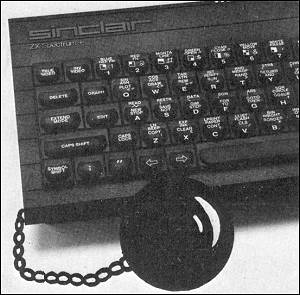| Sinclairvoyance |
IT USED to be one of the most embarrassing questions we micro-owners could be asked, after demonstrating the wonderful graphics and whatnot of a new machine. "Yes, but what use is it?" the hated cynics would respond, and we all muttered about tax programs or telephone directories. Of course, we knew you only do your tax once a year, and it is much easier to look up phone numbers in a book. That was not the point. The point was, doing it by computer was automatically better. It established our status as members of the techno-class, prophets of the new age, with Sir Clive in the role of Bob Dylan and the ZX-81 as his guitar.
Nowadays Sir Clive is everybody's folk hero and not the property of the pioneering elite. Even Fleet Street has given up poking fun at computer boffins and uses his name as a household word.
And, of course, what we do with home computers is all those things we could do before, and usually easier. We have software for address books, lists of recipes, and tax systems. When Sinclair introduced the QL, the machine for the home professional, what was the first commercial program which was not a programming aid? A directory of cocktails, God preserve us.
That is not because of the essential frivolity of home micro owners. It is reflected in all areas of computing. Businesses generally use a computer to replace functions of existing departments. A database, whether it is Lotus or Masterfile mimics paper filing systems. Book-keeping systems monitor existing financial structures. Thus the potential of the computer to solve hitherto insoluble problems is largely ignored. Business does not want to revolutionise work. It wants more efficient work.

Games programmers are rather different. There are many who do conceive new problems, and produce original software to deal with them. You think of games such as Tir na Nog or Sherlock, TLL or Knight Lore. Market research shows that tastes change as users acquire more experience. Where 45 percent of new users look for fun and excitement - arcade qualities - only 17 percent feel the same way after two or three years. Conversely, interest in specialised games, including adventure and strategy, increases from 17 to 35 percent.
But our Software Report in this month's issue indicates software houses are under increasing pressure to produce games to satisfy distributors and retailers who want to sell quickly for a high profit. That means flashy arcade games based on known formulae drawn from amusement arcades and board games. That is what they mean by talking about 'professionalism' in the industry. Standardising the product to a formula and convincing you, the consumer, that the whole thing is for your benefit entirely.
You might think the new information databases, which give instant access to enormous amounts of knowledge, would change things. But at present most business networks are little more than electronic mailboxes attached to silicon encyclopaedias. Where an interactive network such as Micronet 800 throws itself open to the public, what do we do? We write lots of little messages to each other, many very frivolous, others more serious. After all, it's better than using the phone. Sort of.
We see something similar in education. The Government talks of a generation of computer literate kids. In April 1984 we criticised that scheme, and this month headmaster David Dodds adds flesh and bone to our argument. He tells a story of programmers, who do not understand education, returning to drill techniques of the 19th century. That has nothing to do with the exciting future envisaged by enthusiasts like Sir Clive.
He sees it differently. He has visions of robot supermen descending on the starving third world to teach it how to feed itself. He thinks we can all live like the aristocrats of ancient Athens, with robots as slaves. Never mind that the rich West has shown small willingness to give away the existing benefits of new technology. Never mind that the Athenians were an impoverished lot in a world of violent instability. Those things could be, and the optimist says they shall be.
Sir Clive admits that what he sees today, is disappointing and doubts whether government is likely to do much to create a radically new society. It is entrepreneurs like himself who will do it.
But our entire social and economic structure was never designed for it. It was built to make the best of a bad job in a world where there was a lot of hard, unrewarding work to be done and not much enthusiasm for it. We are not talking about the last 150 years, but attitudes which stretch back millennia. They are the attitudes which say men must compete rather than co-operate with robots.
Perhaps the information technology, Micronet and its big brothers, will inch us forward. Perhaps 1985 will be the year of the modem. But as long as those systems are used as a new way of doing old things, nothing much will change as far as the quality of life goes. D H Lawrence wrote: "Don't make a revolution in the name of organised labour. God knows man has had enough of labouring. Let's make a revolution for fun." If you want to see Sir Clive's golden age, you must change attitudes, and change them yourselves. Hackers, Micronetters, arcade junkies and code freaks, it really is down to you.
Chris Bourne